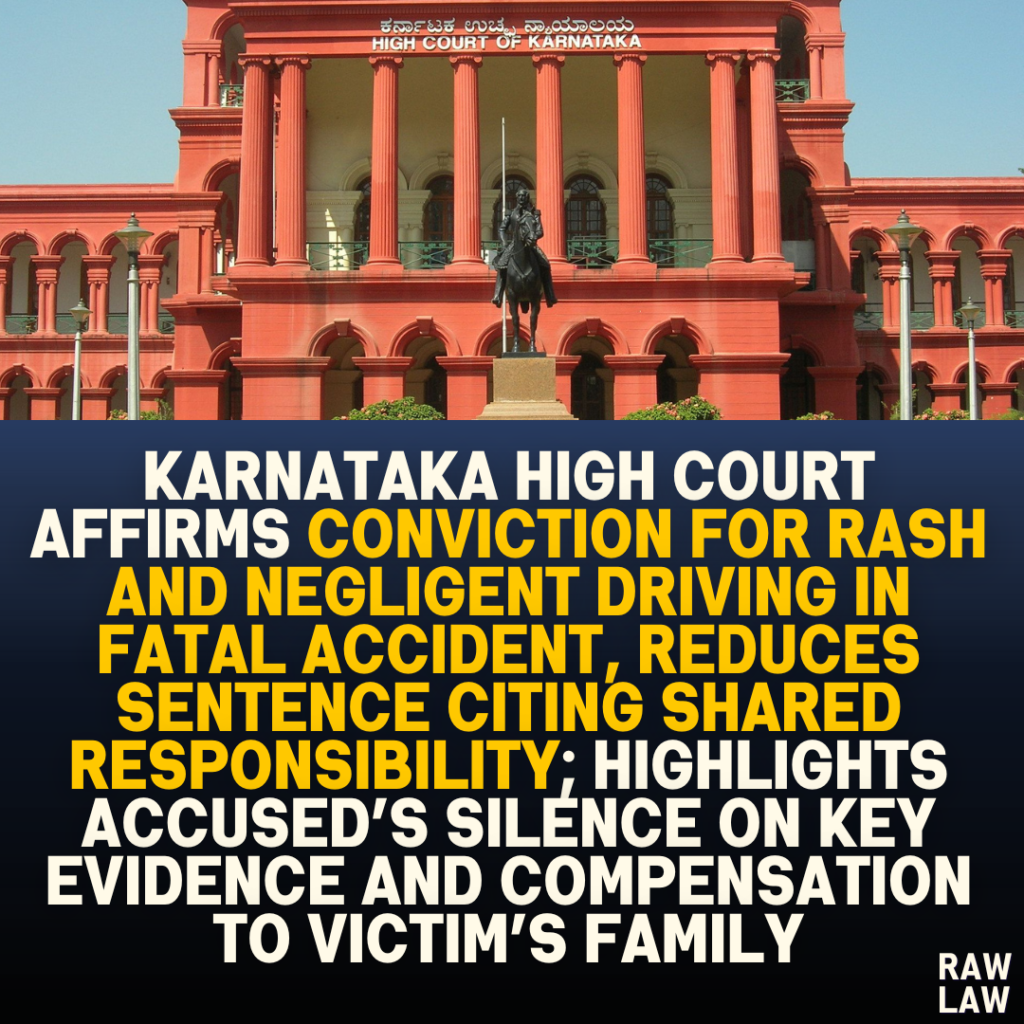Court’s Decision: The Karnataka High Court partially allowed the Criminal Revision Petition, modifying the sentence imposed by the Trial Court and confirmed by the First Appellate Court. While maintaining the conviction for offenses under Sections 279, 338, and 304A of the Indian Penal Code, the Court reduced the sentence of simple imprisonment from one year to six months. Additionally, the fine was increased by ₹25,000, directing the entire enhanced fine amount to be paid as compensation to the deceased’s dependents.
Facts: The incident involved a fatal accident where the accused, driving a private bus, allegedly operated the vehicle in a rash and negligent manner. On 26th August 2009, the accused made a right turn into a bus stand without adequate caution, leading to a collision with a motorcycle. This accident resulted in grievous injuries to both the rider and pillion rider of the motorcycle, with the rider succumbing to his injuries en route to the hospital.
Issues:
- Whether there was a patent legal or factual error in the lower courts’ findings that warranted interference.
- Whether the sentence imposed was excessive, considering the circumstances of the incident.
Petitioner’s Arguments: The petitioner argued that the conviction was based on flawed evidence, specifically pointing out the alleged inaccuracies in eyewitness testimony. The petitioner’s counsel contended that the accused had signaled appropriately before turning and that the claimed speed of 80 km/h was an exaggeration, which would have made turning impossible under normal circumstances.
Respondent’s Arguments: The High Court Government Pleader supported the conviction and sentence, asserting that the evidence on record justified the findings of rash and negligent driving by the accused.
Analysis of the Law: The court underscored the legal duty of the trial court to provide an opportunity for the accused to explain any incriminatory evidence against them, as per Section 313 of the Code of Criminal Procedure. It noted that the accused failed to make use of this provision to clarify his version of the incident.
Precedent Analysis: The Court referenced Ravi Kapur v. State of Rajasthan (2012), emphasizing that a lack of response by the accused under Section 313 Cr.P.C. could lead to adverse inference. It further highlighted the importance of corroborative testimony from eyewitnesses in confirming the sequence of events.
Court’s Reasoning: The Court found that while some discrepancies were evident in the evidence (e.g., exaggerated testimony regarding the speed of the bus), these did not fundamentally undermine the prosecution’s case. It held that the accused’s failure to utilize the opportunity to explain his version weighed against him. The Court reasoned that the motorcyclist’s actions also contributed to the accident, as the motorcycle was on the extreme right side of the road at the time.
Conclusion: The Court concluded that while the conviction for rash and negligent driving was justifiable, the sentence required modification. Taking into account the mitigating circumstances and the shared responsibility in the accident, the Court reduced the imprisonment term and enhanced the fine to support the deceased’s dependents.
Implications: This judgment emphasizes the importance of providing compensation to the victim’s family in cases of fatal accidents, even where shared responsibility may exist. It also reinforces procedural obligations for the accused under Section 313 Cr.P.C., stressing the significance of utilizing this opportunity to prevent adverse inferences. The decision further highlights the judiciary’s discretion to adjust sentencing, considering factors such as first-time offense and mitigating circumstances.



